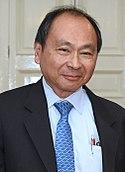Francis Fukuyama Quote
While Koreans also are relatively group-oriented, they also have a strong individualistic streak like most Westerners. Koreans frequently joke that an individual Korean can beat an individual Japanese, but that a group of Koreans are certain to be beaten by a group of Japanese.36 The rate of employee turnover, raiding of other companies’ skilled labor, and the like are all higher in Korea than in Japan.37 Anecdotally, there would seem to be a lower level of informal work-oriented socializing in Korea than in Japan, with employees heading home to their families at the end of the day rather than staying on to drink in the evenings with their workmates.38
Francis Fukuyama
While Koreans also are relatively group-oriented, they also have a strong individualistic streak like most Westerners. Koreans frequently joke that an individual Korean can beat an individual Japanese, but that a group of Koreans are certain to be beaten by a group of Japanese.36 The rate of employee turnover, raiding of other companies’ skilled labor, and the like are all higher in Korea than in Japan.37 Anecdotally, there would seem to be a lower level of informal work-oriented socializing in Korea than in Japan, with employees heading home to their families at the end of the day rather than staying on to drink in the evenings with their workmates.38
Related Quotes
People accuse me of falling in love easily. It just means that I'm able to see the beauty in most of the people who cross paths with me and I appreciate it for what it is and also for what it isn't. L...
Ashly Lorenzana
Tags:
beauty, falling in love, flaws, imperfection, loneliness, love, passion, people, souls, strength
About Francis Fukuyama
Francis Yoshihiro Fukuyama (; born October 27, 1952) is an American political scientist, political economist, international relations scholar, and writer.
Fukuyama is best known for his book The End of History and the Last Man (1992), which argues that the worldwide spread of liberal democracies and free-market capitalism of the West and its lifestyle may signal the end point of humanity's sociocultural evolution and political struggle and become the final form of human government, an assessment met with numerous and substantial criticisms. In his subsequent book Trust: Social Virtues and Creation of Prosperity (1995), he modified his earlier position to acknowledge that culture cannot be cleanly separated from economics. Fukuyama is also associated with the rise of the neoconservative movement, from which he has since distanced himself.
Fukuyama has been a senior fellow at the Freeman Spogli Institute for International Studies since July 2010 and the Mosbacher Director of the Center on Democracy, Development and the Rule of Law at Stanford University. In August 2019, he was named director of the Ford Dorsey Master's in International Policy at Stanford.
Before that, he served as a professor and director of the International Development program at the School of Advanced International Studies of Johns Hopkins University. Previously, he was Omer L. and Nancy Hirst Professor of Public Policy at the School of Public Policy at George Mason University.
He is a council member of the International Forum for Democratic Studies founded by the National Endowment for Democracy and was a member of the Political Science Department of the RAND Corporation. He is also one of the 25 leading figures on the Information and Democracy Commission launched by Reporters Without Borders. In 2024 he received the Riggs Award for Lifetime Achievement in International and Comparative Public Administration.
Fukuyama is best known for his book The End of History and the Last Man (1992), which argues that the worldwide spread of liberal democracies and free-market capitalism of the West and its lifestyle may signal the end point of humanity's sociocultural evolution and political struggle and become the final form of human government, an assessment met with numerous and substantial criticisms. In his subsequent book Trust: Social Virtues and Creation of Prosperity (1995), he modified his earlier position to acknowledge that culture cannot be cleanly separated from economics. Fukuyama is also associated with the rise of the neoconservative movement, from which he has since distanced himself.
Fukuyama has been a senior fellow at the Freeman Spogli Institute for International Studies since July 2010 and the Mosbacher Director of the Center on Democracy, Development and the Rule of Law at Stanford University. In August 2019, he was named director of the Ford Dorsey Master's in International Policy at Stanford.
Before that, he served as a professor and director of the International Development program at the School of Advanced International Studies of Johns Hopkins University. Previously, he was Omer L. and Nancy Hirst Professor of Public Policy at the School of Public Policy at George Mason University.
He is a council member of the International Forum for Democratic Studies founded by the National Endowment for Democracy and was a member of the Political Science Department of the RAND Corporation. He is also one of the 25 leading figures on the Information and Democracy Commission launched by Reporters Without Borders. In 2024 he received the Riggs Award for Lifetime Achievement in International and Comparative Public Administration.
